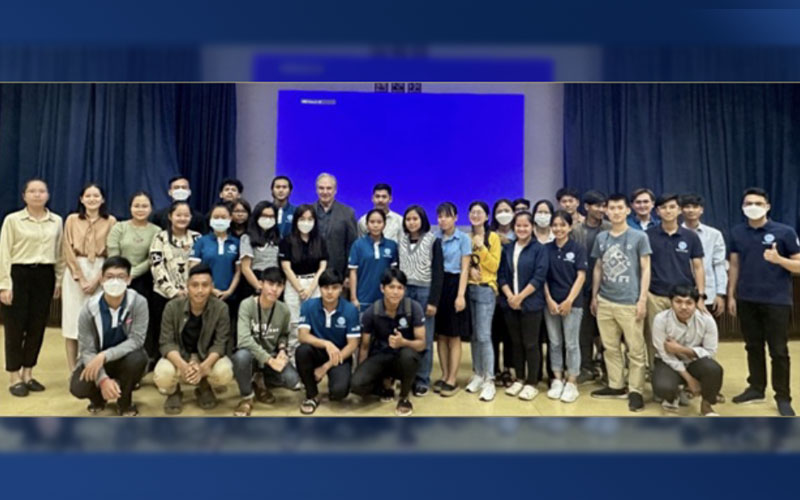By Cara Aungst
 ITC students in Phnom Penh, Cambodia learning about entrepreneurship and intrapreneurship.
ITC students in Phnom Penh, Cambodia learning about entrepreneurship and intrapreneurship.
As a professor of engineering entrepreneurship at Penn State, Frank Koe lives and breathes entrepreneurship and intrapreneurship — the concept of creating change from within corporations. He organized the conference, “Intrapreneurship: Employees as Changemakers” that was held at Penn State in May. His patented products have occupied shelves in Walmart, Dicks Sporting Goods and on Amazon, and his award-winning text, Fabric for the Designed Interior that began while serving as Vice President of Scalamandre, a noted New York textile company, is on its third edition. But this May, he asked the question, ‘What can I bring that I know about entrepreneurship and intrapreneurship to a very unfamiliar place in the world’?
“When we think of entrepreneurship in the U.S., what may come to mind are emboldened people who possess an active entrepreneurial mindset and are willing to take risks,” he said. “Money is available for entrepreneurs to try out their ideas and if they fail to create a sustainable business, they may simply try again. From the US television series Shark Tank to friends and family to seed funding through online Crowdfunding sites, there appears to be an endless array of opportunities to obtain some degree of funding to determine if one’s idea has potential.”
That’s not the case in Cambodia, where Koe recently spent two months as a Senior Fulbright Specialist, where his goal was to assist the Institute of Technology of Cambodia (ITC) in developing an entrepreneurial program that would invigorate their existing STEM curriculum and programs and build an entrepreneurial ecosystem to support interest in entrepreneurial growth.
Linear thinking follows a systematic, step-by-step progression that leads to conclusions… however, entrepreneurial thinking is more non-linear which means making connections between unrelated concepts and ideas. Both ways of thinking are needed.
Not only is funding not as readily available in Cambodia but there are other challenges for aspiring entrepreneurs. Cambodia has had a difficult history, particularly while Pol Pot, also known as Saloth Sar, ruled the country as Prime Minister of the Communalistic Party from 1975 to 1979. Its GDP accounts for just 0.01 percent of the world economy. Companies within the country tend to be pyramidal or hierarchical, and less open to new ideas from within the organization.
But Koe says that the country is in the midst of tremendous growth — and it’s growth that he attributes to innovative people. “Regardless of where people reside, potential entrepreneurs with the mindset and geared toward finding opportunity and creating value, businesses can be born,” he said.
Creating change from the inside out
Koe spent time getting to know the talent at ITC over Zoom calls in the months before he flew to the country. Then, in May, he joined the faculty, students and administration to evaluate their entrepreneurial program and discover what can be accomplished to make entrepreneurship and intrapreneurship an integral part of their STEM education. In true intrapreneurship spirit, he wanted to get the students engaged in creating change from the inside out.
ITC is a 5-year school that only offers engineering and technology degrees. It’s rich in STEM and extremely rigorous. And, Koe points out, by its very nature, it is extremely linear. “Linear thinking follows a systematic, step-by-step progression that leads to conclusions… however, entrepreneurial thinking is more non-linear which means making connections between unrelated concepts and ideas. Both ways of thinking are needed in order to advance an idea, especially a technical one,” he said.
“It’s possible to merge these two methods of thinking to help broaden a student’s perspective and increase possibility. Why can’t a bridge be structurally sound and functional, and also be beautiful?”
Engaging with local startups, entrepreneurs, and business leaders to foster connections between the university and the wider entrepreneurial community is essential. It delivers real-world insights and opportunities and helps define how the entrepreneurial mindset works.
Over the next two months, Koe worked with students and faculty to advance entrepreneurship and intrapreneurship. He taught a short course on entrepreneurship to students and faculty and worked with some members of the faculty who were already fully vested in establishing an entrepreneurial ecosystem. He met with companies about how ITC students could innovate from within and help to advance their corporate mission and goals.
Now that he’s back in the States, he is ensuring that ITC students are supported as they continue on their entrepreneurship journey by connecting them with the Global Entrepreneurship Network, which currently connects entrepreneurs in 180 countries, bringing in outside speakers as part of an Entrepreneur in Residence program and creating an entrepreneurship club initiated and run by students.
“Engaging with local startups, entrepreneurs, and business leaders to foster connections between the university and the wider entrepreneurial community is essential,” he said. “It delivers real-world insights and opportunities and helps define how the entrepreneurial mindset works.”
 Professor of Engineering Entrepreneurship Frank Koe
Professor of Engineering Entrepreneurship Frank Koe
IMPACT AND REWARDS
Koe says that one of the greatest rewards of his time in Cambodia was learning how to best bring entrepreneurship and intrapreneurship education to ITC, and helping them see that learning about entrepreneurship can indeed help save a great deal of time and maximize the chances of converting an idea into an opportunity.
“The combination of a country’s culture, language, religion, economic position, and political history greatly influences its growth and development and how it connects to the rest of the world. The more we can learn about a country when trying to bring something relatively new to it like entrepreneurship and intrapreneurship education, the better the chances will be to build sustainable partnerships for change.”






